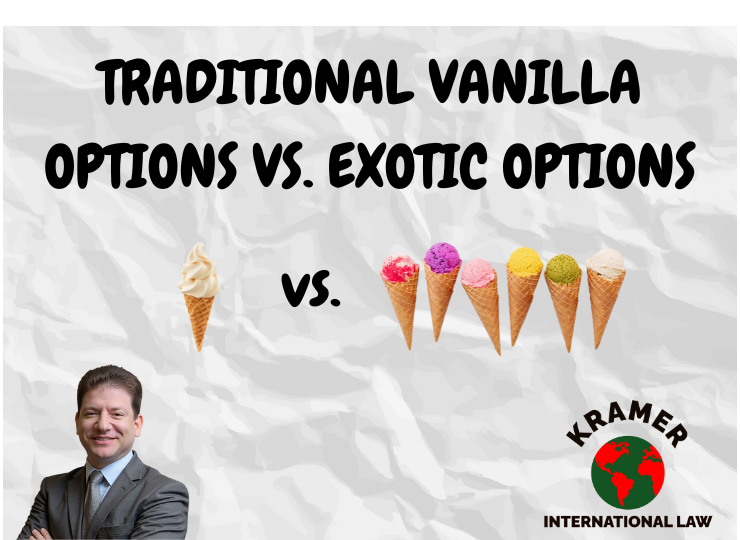TRADITIONAL (“VANILLA”) OPTIONS vs. EXOTIC OPTIONS
June 6, 2025
Randy S. Kramer


TRADITIONAL (“VANILLA”) OPTIONS vs. EXOTIC OPTIONS
An option is a financial tool that gives the buyer the right, but not the obligation, to buy or sell an underlying security, such as a stock, at a predetermined price within a specified timeframe. Investors often favour options because they allow speculation on price movements without having to own the actual stock.
Call options give investors the right to purchase the underlying asset, while put options allow for selling it. The act of converting an option into shares is referred to as exercising, with the price at which this occurs known as the strike price.
Exotic options, on the other hand, are specialized financial instruments that can be tailored to meet investor needs. They are a subset of options that allow investors to take advantage of the distinct characteristics of options contracts to pursue alternative investment strategies. They differ in how their payoffs are structured and the timing of when they can be exercised, making them more complex than standard plain "vanilla" call and put options.
Exotic options represent variations of the two most common types of options contracts: American and European. Holders of American options can exercise their rights at any time before or on the expiration date, whereas European options only allow execution on the expiration date itself. Exotic options combine features of both American and European options.
Exotic options offer a high degree of customization to address specific investment objectives or risk management issues that traditional vanilla options may not be able to accommodate.
Here's how traditional vanilla options compare to exotic options:
Payoff Structure
Vanilla Options: Simple. Based on the underlying asset's price at a single point (expiration or exercise).
Exotic Options: Complex. Can depend on average prices, barriers, multiple assets, and other conditions.
Customization
Vanilla Options: Standardized Terms (strike price, expiration, type).
Exotic Options: Highly customizable to specific investor needs.
Trading Venue
Vanilla Options: Primarily exchange-traded.
Exotic Options: Primarily over-the-counter (OTC).
Complexity
Vanilla Options: Relatively straightforward to understand and value.
Exotic Options: Significantly more complex to understand, price, and hedge.
Liquidity
Vanilla Options: Generally higher.
Exotic Options: Often lower, making it harder to find a buyer or seller.
Premiums
Vanilla Options: Can vary, but generally less expensive for similar features.
Exotic Options: Can be higher due to customization and complexity, though some can offer lower premiums for precise conditions that are less likely to materialize.
International Business Law Firm
Providing international business law services respecting the law of the US, Canada, and the UK
Serving growth companies, startups, and investors
TO CONTACT US:
E: info@kramerintlaw.com
T (US): + 1.347.588.4060, Ext. 1010
© 2025 Kramer International Law
All rights reserved.


T (Can): + 1.514.470.0717, Ext. 1010
